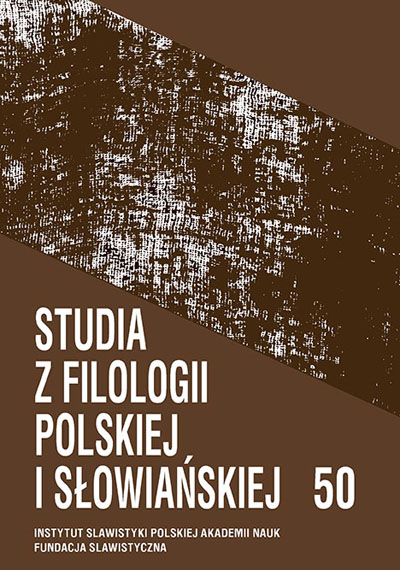Становление антропоцентристских теорий в современном языкознании
The development of anthropocentric theories in modern linguistics
Author(s): Mikhail LabashchukSubject(s): Language and Literature Studies
Published by: Instytut Slawistyki Polskiej Akademii Nauk
Keywords: anthropocentrism; sociocentrism; scientific paradigm; idiolect; sociolect; category; sign; polysemy
Summary/Abstract: The article highlights the unique position of anthropocentric theories within modern linguistics. To exemplify tendencies in the forming of idiolectic language theories in their functional aspects, I analyse the gnoseological approach in Alexander Kiklevich's linguistics. Modern linguistics differentiates between anthropocentric and anthropological theories of language. The base category of the latter is sociolect as a supraindividual phenomenon. Anthropocentric linguistic theories are, in their turn, based on the category of idiolect as the ontologically unique category from which stems the existence of both the individual and society. In the functional approach of anthropocentric theories, sociolect itself is seen as a part of idiolect, whereas sociological theories, on the contrary, consider the idiolect a part of sociolect. The two basic approaches, or sets of criteria, traditionally applied to defining the notion of category have been: (1) logical (adopting the perspective of the rational and logical capacities of consciousness) and (2) empirical (representing the perspective of the sensual experience of the individual). Beginning in the late 19th century, a new approach, or criterion, appeared and has been growing in importance. It might be referred to as: (3) the linguistic approach, which focuses on the exceptionality of how the necessarily unified rational-logical,sensual-imaginary and emotional experiences of the individual are categorised. It is namely that third aspect, or criterion, that is actualised in the studies of the individual's cognitive and mental capacities. Such actualisation is fostered by the researchers' awareness of the focusing role of individual language in regulating the cognitive and communicative manifestations of behaviour. Within the structure of the sign, comprising of the signifying and the signified, the signified is itself a complex structure, essentially describable on three logical and prototypical levels: – the hypernimic (generic, abstract-logical) level, – the base (generic-particular, mental-imaginary) level (whose prototypical structure is the centre-periphery), and – the hyponymic (particular, mixed, syncretic) level. Alexander Kiklevich's theory proposes a classification of scientific paradigms; discusses the pragmatics and functionality of language in communication; emphasises the peculiarity of the conceptualising of information on the basic, supra-basic and sub-basic levels of communication; criticises the content of modern conceptology; finally, it develops and elaborates a distinctive approach to the issues of language polysemy and metaphor. Anthropocentric theories of modern linguistics strengthen the long-stipulated leading position of the discipline among the human sciences.
Journal: Studia z Filologii Polskiej i Słowiańskiej
- Issue Year: 2015
- Issue No: 50
- Page Range: 249-269
- Page Count: 21
- Language: Russian

